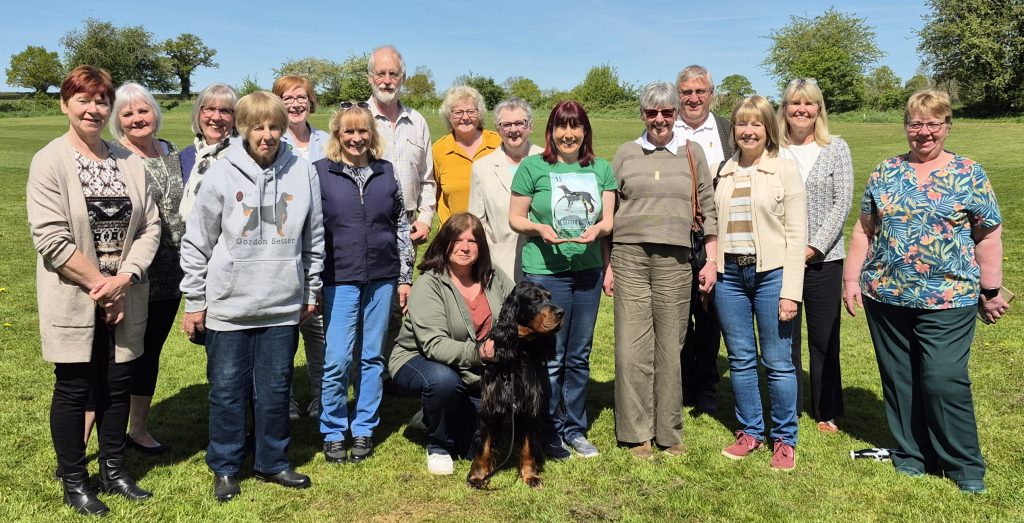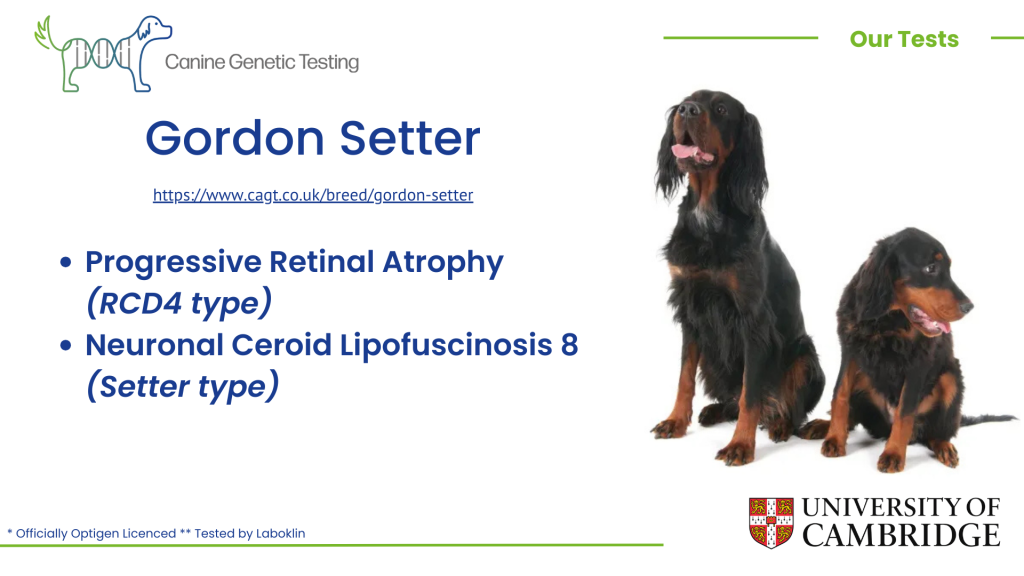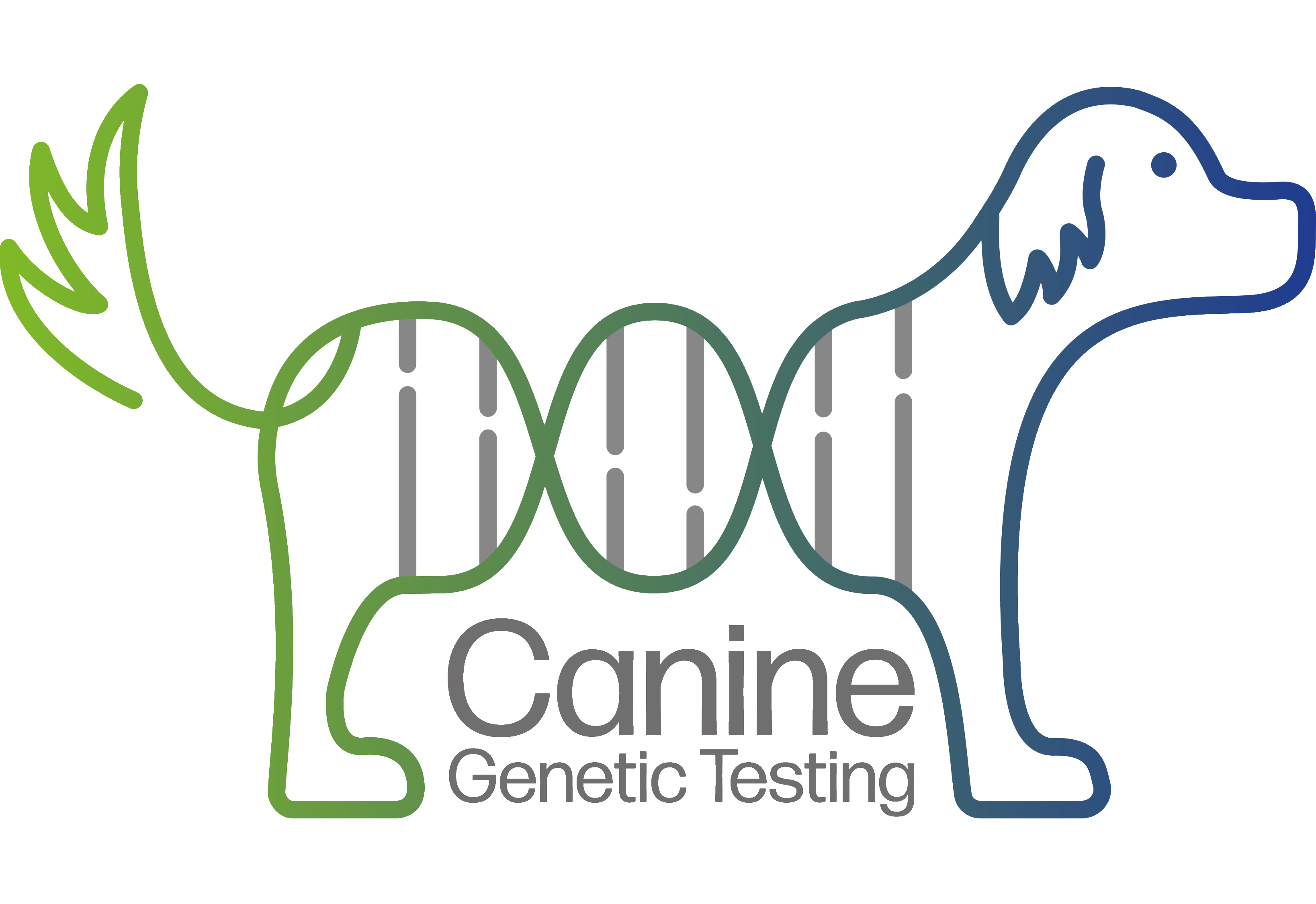The Canine Genetics Centre has worked closely with many breeds over the years, to investigate inherited disorders that represent a challenge to their health. In the next of our series, we focus on the Gordon Setter, a breed that the CGC started to work alongside over 15 years ago, when a new and emerging form of late onset progressive retinal atrophy first became apparent in this breed. The CGC went on to identify the mutation that causes this form of PRA, that now referred to as PRA rcd-4 (for rod cone degeneration type 4). The Gordon Setter’s Breed Health Co-ordinator is Kathryne Wrigley, and her tireless efforts to advocate for the health of this lovely breed, has played a key part in the successful and longstanding relationship between the CGC and the Gordon Setter breed community, including the development of the DNA test for PRA rcd-4.
In March of 2025 Kathryne was the very worthy recipient of the CGC’s first Canine Health and Welfare Award, and we asked Kathryne if she would like to tell the story as she remembers it:
 I remember the day very clearly in February 2009 when the Gordon Setter community learned we had PRA in our breed. A breed show had been cancelled due to the snow so we were all at home when an email dropped in our inbox with the concerning news that a breeder had three of her Gordons diagnosed with late onset PRA.
I remember the day very clearly in February 2009 when the Gordon Setter community learned we had PRA in our breed. A breed show had been cancelled due to the snow so we were all at home when an email dropped in our inbox with the concerning news that a breeder had three of her Gordons diagnosed with late onset PRA.
This was the first real health crisis Gordoners had faced, and it caused shock and upset throughout the breed. I had only been appointed BHC in December 2008 so this was a baptism of fire! Immediately there was a flurry of activity and initial contact was made with the then AHT and Cathryn Mellersh and her team.
There was a lot of discussion within the breed, and I had the huge job of explaining the situation to concerned breeders and all the way through our PRA journey I was the go between for breeders and owners, the KC and Cathryn. We had a meeting after the breed AGMs which filled the village hall and really demonstrated the level of concern amongst Gordon breeders.

There was a fear about breeding and making the wrong decision which may have resulted in breeding a PRA affected dog. At the time we could only publish a list of dogs who had produced affected progeny so breeding was a gamble and it certainly put a black cloud over the breed at this time.
However, the Gordoners did swing into action and on Cathryn’s advice we started collecting DNA samples and then raising funds so we could start to investigate this condition. We took swabs from affected dogs and then we had to find dogs we thought were clear – criteria were for older dogs with a clear eye examination. Owners could do the buccal swabs themselves but many asked me to do it, which I did, and I remember going to shows with a bag of swabs to get samples from dogs we wanted in the research. Everyone was keen to help so we could get a DNA test.
Amazingly by March 2011 we had a DNA test for PRA rcd-4 so the whole process took just two years. There was great relief once we had the test but then some trepidation as we learned what we had. I was one of the breeders who had a litter born in March 2011 so as I looked after the pups I was nervously waiting for the results of their parents tests and I know others were in the same situation.
Once we started testing it became clear that PRA rcd-4 was widespread throughout the breed with a very high number of carriers and some affecteds, even from lines who hadn’t shown any clinical signs of blindness. The breed then had to take some time to process this information and learn how we could move forward.
The Gordon Setter breeding community embraced DNA testing and I am proud to say have been very compliant. The test took the fear away and enabled us to make informed decisions. No dog had to be removed from breeding program because of it’s PRA status. Carrier and initially some affecteds were bred from so we could keep our gene pool as open as possible. The breed now produces a much higher number of clears than carriers (and no affecteds) so we have made significant process during the 14 years of testing.
 None of this would have been possible without Cathryn and her team, firstly finding the gene and producing the test and then being a continual support for the breed ever since. The CGC team is invaluable to breed health and as a BHC I still rely on help and advice from them, whether it’s further PRA queries or advice on other conditions.
None of this would have been possible without Cathryn and her team, firstly finding the gene and producing the test and then being a continual support for the breed ever since. The CGC team is invaluable to breed health and as a BHC I still rely on help and advice from them, whether it’s further PRA queries or advice on other conditions.
PRA rcd-4 taught the Gordon community a lot, it showed us if we had a health concern, by working together we could do something about it. Whatever future health concerns we may have, I know we can face it with the expertise and ongoing support from the CGC.
Kathryne Wrigley RVN,Gordon Setter BHC
The Canine Genetics Centre team would like to thank Kathryne for writing this article, and for her dedication to this lovely breed. Through Canine Genetic Testing (CAGT) we offer two DNA tests for the Gordon Setter, and we are offering a 20% discount of them both till the end of the month.




Comments are closed